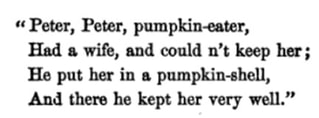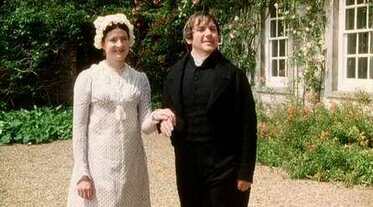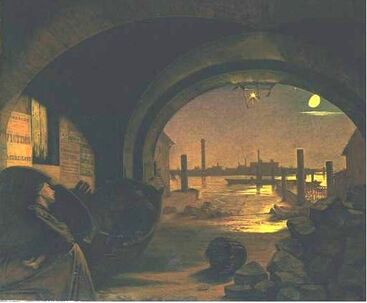| Clutching My Pearls is my ongoing blog series about my take on Jane Austen’s beliefs and ideas, as based on her novels. Click here for the first in the series. |
| One reason for Austen's enduring popularity is the timelessness of her novels. She creates characters and situations that are familiar to us. We talk about her characters as though they were real people. We even argue about them. But in this post I want to talk about how Austen's world was different from ours. |
At the conclusion of Persuasion, Austen writes: "When any two young people take it into their heads to marry, they are pretty sure by perseverance to carry their point, be they ever so poor, or ever so imprudent, or ever so little likely to be necessary to each other's ultimate comfort. This may be bad morality to conclude with, but I believe it to be truth."
Notice that even before compatibility, Austen lists poverty as a serious barrier to marriage, and she considers this to be a moral question...
| "Support! What Support will Laura want which she can receive from him?" "Only those very insignificant ones of Victuals and Drink," (answered she). "Victuals and Drink! (replied my Husband in a most nobly contemptuous Manner) and dost thou then imagine that there is no other support for an exalted Mind (such as is my Laura's) than the mean and indelicate employment of Eating and Drinking?" "None that I know of, so efficacious," (returned Augusta). "And did you then never feel the pleasing Pangs of Love, Augusta? (replied my Edward) Does it appear impossible to your vile and corrupted Palate, to exist on Love? Can you not conceive the Luxury of living in every Distress that Poverty can inflict, with the object of your tenderest Affection?" |
 In this old nursery rhyme, "keep" means support, not retain
In this old nursery rhyme, "keep" means support, not retain In Sense and Sensibility, the usually cheerful Mrs. Jennings soberly predicts that Edward Ferrars and Lucy Steele "will set down upon a curacy of fifty pounds a-year, with the interest of his two thousand pounds, and what little matter Mr. Steele and Mr. Pratt can give her.—Then they will have a child every year! and Lord help 'em! how poor they will be!"
Mrs. Croft, a sensible and likeable woman, declares in Persuasion, "To begin [an engagement] without knowing that at such a time there will be the means of marrying, I hold to be very unsafe and unwise, and what I think all parents should prevent as far as they can."
Sir Thomas Bertram of Mansfield Park “is an advocate for early marriages, where there are means in proportion." Early marriage helps a young man avoid temptation, of course. Sir Thomas “would have every young man, with a sufficient income, settle as soon after four-and-twenty as he can.” Note how he repeats himself on the matter of income. And while Austen presents Sir Thomas as a man with faults, she does not portray him as malicious or wrong-headed in his basic principles.
Parents had strong views about who their children would marry, because the right marriage could increase the security and prosperity of the entire family but an imprudent marriage could lead to disaster, as is illustrated by the contrast between the fates of the three Ward sisters in Mansfield Park.
 Life is a matter of trade offs, as Charlotte Lucas could tell us
Life is a matter of trade offs, as Charlotte Lucas could tell us One consequence of this social, moral, and legal clampdown, obviously, is that there were a lot of unhappy marriages and just general hypocrisy.
If women were not in a position to get married, they were expected to remain chaste. However, the middle and lower classes of Austen's time were well aware of the prevalence of infidelity and illegitimacy in the upper classes. What was preached for the lower classes was flouted by the privileged few. King George III's three sons had over 50 illegitimate children. He had only one legitimate grandchild, Princess Charlotte.
In the end, all choices are a matter of trade-offs, even today. One of the downsides of modern sexual license is that fewer children today know the stability of growing with the same two parents. Today half the children in England are born out of wedlock and the percentages are even higher in other countries.
 Past and Present 3 by Augustus Egg, 1858
Past and Present 3 by Augustus Egg, 1858 As we have seen, the message is repeated throughout Austen -- don't get married if you are not in a position to support your wife and any children that come along. Before Edward and Elinor get their happy ever after in Sense & Sensibility, Austen spells out, in detail, how much money they will have. Colonel Brandon gives Edward a living in Delaford which he reckons would enable a bachelor to live comfortably but "it cannot enable him to marry." The lovebirds also have three thousand pounds between them, which, invested at four or five percent, brings them another 160 and 200 pounds a year, "and they were neither of them quite enough in love to think that three hundred and fifty pounds a-year would supply them with the comforts of life." Fortunately, Edward's mother provides another ten thousand pounds which will give them another 400 a year.
Austen is at pains to prove to her reader that Elinor and Edward are not doing anything rash. Perhaps she was thinking of her own family--her father married her mother on the narrow income of a clergyman, had eight children, and when he died, Mrs. Austen, Jane and Cassandra were not only homeless but thrown into dependence on Jane's brothers.
Strict moral codes were not just a tool of the Patriarchy to oppress and control women for the fun of it. They were intended to prevent the creation of too many mouths to feed.
Here's another, earlier post about Austen, marriage and romance novels.

 RSS Feed
RSS Feed